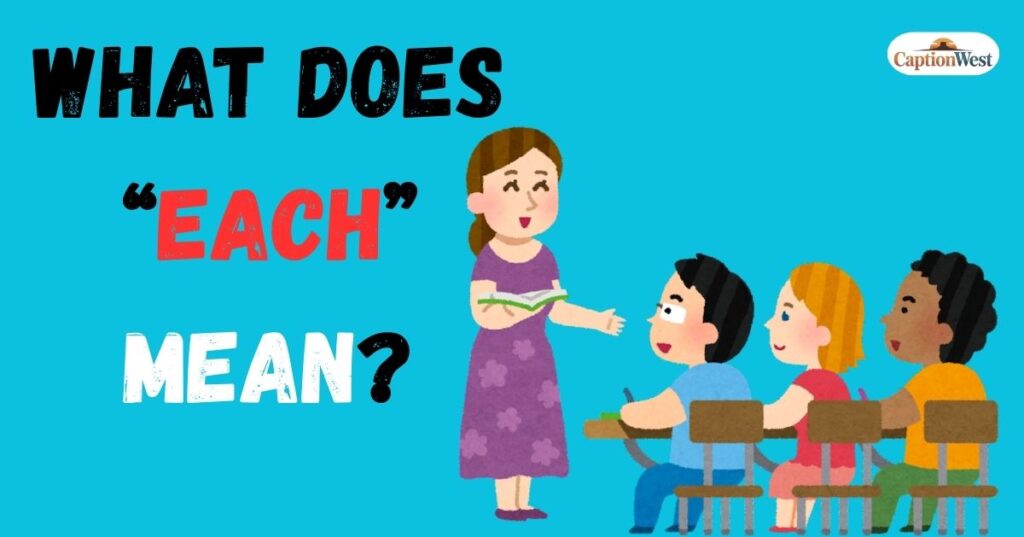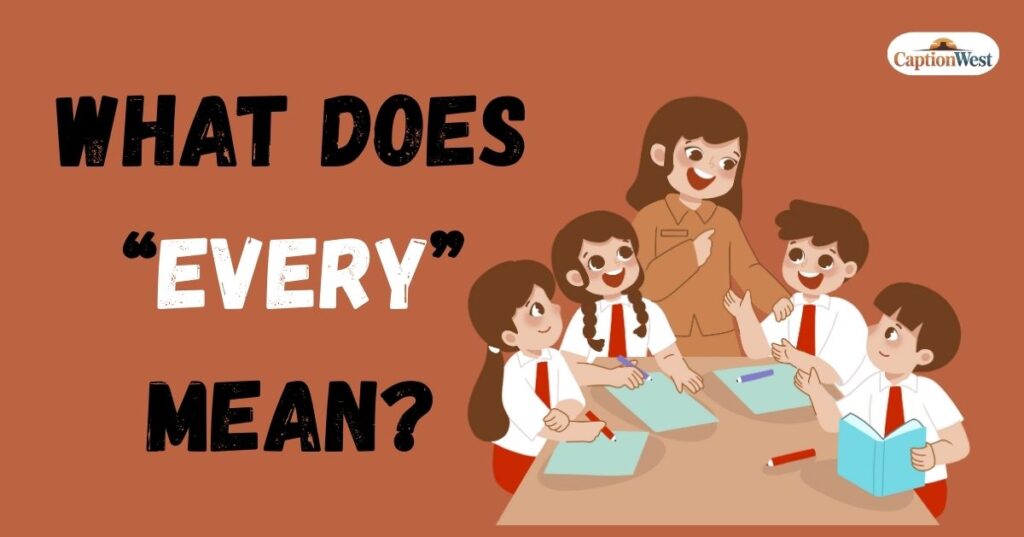English grammar can be tricky, especially when it comes to words that look similar but are used differently. A very common confusion arises between “each” and “every.” At first glance, they might seem interchangeable. However, once you dive into grammar rules and sentence usage, you realize there is a subtle yet important difference between each and every.
If you’ve ever asked yourself questions like:
- Should I say each student is present or every student is present?
- Can “each” and “every” be used for two items, or only for more?
- Which one emphasizes individuals, and which focuses on the group?
Then this detailed guide is exactly what you need. By the end, you’ll understand their meanings, rules, usage in sentences, common mistakes, and examples, so you can write with confidence.
What Does “Each” Mean?

The word “each” is used to highlight individual members of a group. It works when you want to focus on one by one consideration within a set.
Key points about “each”:
- Refers to individual items in a group.
- Can be used when there are two or more items.
- Usually emphasizes separateness or individuality.
- Can also be used as a pronoun.
Examples of “each”:
- Each student has a separate desk.
- The twins each got a medal.
- She spoke to each of them individually.
- Each of the houses has a unique design.
Here, notice how “each” highlights individuals rather than the group as a whole.
What Does “Every” Mean?

On the other hand, “every” focuses on the entire group collectively. It’s used when you want to make a general statement about all members of a set.
Key points about “every”:
- Refers to all members of a group together.
- Works only when there are three or more items.
- Emphasizes collectiveness and generalization.
- Cannot be used as a pronoun (you must add “one” if needed).
Examples of “every”:
- Every player wore the team’s jersey.
- She attends every meeting.
- Almost every student passed the exam.
- Every morning begins with new hope.
Here, “every” highlights the entire group or event in a generalized sense.
The Core Difference Between Each and Every
Now let’s bring it together. The main difference between each and every is about perspective:
| Aspect | Each | Every |
| Group Size | Two or more | Three or more |
| Focus | Individual consideration | Group as a whole |
| Usage | Can act as pronoun or adjective | Only adjective (needs “one” for pronoun use) |
| Tone | Specific, individual | General, collective |
| Example | Each child was given a balloon. | Every child loves ice cream. |
Grammar Rules for “Each” and “Every”
1. Subject-Verb Agreement
Both “each” and “every” are considered singular, so they take a singular verb.
✅ Correct: Each student is responsible for their homework.
❌ Wrong: Each student are responsible.
✅ Correct: Every person is welcome here.
❌ Wrong: Every person are welcome here.
2. Pronoun Use
- “Each” can stand alone as a pronoun.
- “Every” needs “one” when used as pronoun.
✅ They each received a certificate.
✅ Every one of the applicants submitted forms.
3. With “Of”
When followed by a plural noun, use “each of” or “every one of.”
✅ Each of the players was ready.
✅ Every one of the cookies was eaten.
4. With Adverbs
When using adverbs like almost, nearly, practically, always use every.
✅ Practically every seat was filled.
✅ Almost every book was sold.
Examples in Different Contexts

Everyday Conversations
- Each friend called me to congratulate me individually.
- Every friend I have was at the party.
Academic or Professional Context
- Each researcher contributed a unique perspective.
- Every student must follow the rules.
Emotional or Poetic Use
- She remembered each smile from her childhood.
- Every moment with you feels special.
Common Mistakes with Each and Every
Many English learners (and even native speakers) make mistakes when choosing between “each” and “every.” Here are the most common ones:
- Using “every” for two items
❌ Every parent was waiting outside (referring to only mother and father).
✅ Each parent was waiting outside. - Wrong subject-verb agreement
❌ Each of the boys are playing.
✅ Each of the boys is playing. - Mixing pronoun usage
❌ Every should bring their ID.
✅ Everyone should bring their ID.
✅ Each should bring their ID.
Why English Learners Confuse Them

The confusion comes from the fact that in many other languages, one word covers both “each” and “every.” For example, in some languages, there is no distinction between individual focus and group focus. That’s why mastering the difference between each and every is key to sounding natural in English.
Synonyms You Can Use
While “each” and “every” are unique, some near synonyms can sometimes replace them (depending on the context):
- Each → either, one by one, individual, per
- Every → all, entire, whole, all of
👉 Example:
- Each child received a gift. → Every child received a gift. (both correct but with different nuance)
FAQs about “Each” and “Every”
Q1: Can I use “each” for two people?
Yes. Example: Each parent attended the ceremony.
Q2: Can I use “every” for two things?
No. “Every” is used only for three or more.
Q3: Is it correct to say “each and every”?
Yes, it’s common in spoken English for emphasis, though grammatically redundant. Example: I want to thank each and every one of you.
Q4: Do “each” and “every” take singular or plural verbs?
Always singular verbs. Example: Each student is here. Every student is excited.
Read Must: Difference Between Then and Than: Meaning, Usage, and Examples
Conclusion
The difference between each and every may seem small, but it changes how your sentence feels.
- Use “each” when you’re focusing on individuals in a group (two or more).
- Use “every” when you’re referring to the entire group collectively (three or more).
Mastering this distinction will help you avoid grammar mistakes, improve your fluency, and make your English writing more polished. Next time you’re unsure, just ask yourself: Am I focusing on individuals or the group as a whole? The answer will guide your choice.

